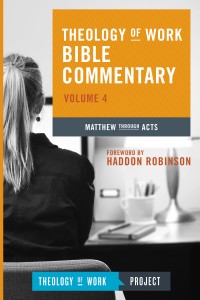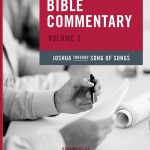 We asked Professor Sean McDonough, professor of New Testament at Gordon-Conwell Theological Seminary in South Hamilton, Massachusetts, about how to get the most out of the resources offered by the Theology of Work Project. Here are some of his thoughts on what’s been useful to him as he works with Christian students.
We asked Professor Sean McDonough, professor of New Testament at Gordon-Conwell Theological Seminary in South Hamilton, Massachusetts, about how to get the most out of the resources offered by the Theology of Work Project. Here are some of his thoughts on what’s been useful to him as he works with Christian students.
TOW: The Theology of Work Project offers a full Bible Commentary, as well as articles about topics ranging from ethics to how churches are helping people integrate faith and work. What resources have you found the most useful?
The generally most useful one is the article on calling. When I speak particularly on college campuses, you basically have two questions people are always asking “Who should I get married to?” and “What should I do with my life?” Both of these involve calling in some sense. But the latter question “What should I do with my life?,” particularly in Christian circles, is often followed by, “Well, if I’m spiritual, I’ll go into ‘full-time ministry.'” That really restricts people from living life to the fullest, particularly in their work life.
The article on calling does a very nice, clear, common sense job of disabusing people of that notion and liberating them to follow God’s call.
The other resource that I find fun is the finance article. Not because I’m particularly good at finance or have a deep interest in finance—almost the opposite. Actually it’s because I struggle to think about how finance would be a means of serving God. The article is clear about laying out what finance is in essence, acknowledging the problems, but also explaining why it exists and how it exists as part of God’s economy in the broadest sense. If there’s any field that people imagine must be about getting money, about greed, it’s finance. The author does a wonderful job of getting some clarity on how it can serve the kingdom.
TOW: You’re on the steering committee of the Theology of Work Project and you’ve served as an editor for the commentary. How did you get involved?
Well, it’s funny, I had two points of connection. When I was a student at doctoral studies at St. Andrews, one of my best friends there, Darrell Cosden, was working precisely on a theology of work. So we would have a good deal of discussion about it. Later, when I came to Gordon Conwell, Will Messenger, the editor of the project, was working there. I would go along to the theology of work things because he asked me to. And it turns out, I finally figured out that my interest in theology of creation, which I’d always been keen on, really did intersect very meaningfully with the theology of work.
TOW: How can professors teaching seminary students use the Theology of Work Bible Commentary?
In my classes, I find it essential to give students a biblically sound basis for speaking into the work their future congregants will do every day–a total of 2,000 hours per person outside the church every year. Grounded in the biblical text, the commentary compels students to take work as seriously as Scripture does–and Scripture takes work very seriously. Professors can supplement more technical commentaries with the “Theology of Work Bible Commentary.” More importantly, we can assign it to students as a way of bridging the gap between biblical exegesis and everyday life.
Because traditional commentaries rarely touch on matters of the workplace, you will continually be invited to look at the Bible from a fresh angle. The TOW commentary will thus serve as a complement to the commentaries they currently use rather than as competition. If you are teaching a class on Exodus, for instance, you will know of the book’s theological and historical richness. But it may help to be reminded that the Exodus is, among other things, a deliverance from an intolerable work situation. Seeing the text in this light provides a natural opening for discussion about the broader implications of the text for the modern world.
 TOW: What distinguishes the Theology of Work Bible Commentary?
TOW: What distinguishes the Theology of Work Bible Commentary?
Three things.
The first is quality. On the biblical side of things, we have gathered a team of scholars with extensive experience in original language exegesis. The vast majority of these scholars hold their doctorates in biblical studies from top universities and teach at some of our finest theological schools. What distinguishes the TOW commentary is that we have given equal consideration to quality in the application portions. Each part of the commentary was exhaustively discussed by a worldwide group of business leaders, marketplace ministers, and theologians.
The second is efficiency. While we have endeavored to give readers an appropriate orientation to the literary and historical contexts of the biblical texts, we do not go on at length about things with which readers are already familiar. Instead, the focus is on what the Bible says about work.
This leads naturally to the third point: applicability. As professors training pastors, it is easy for us to huddle in small, self-referential circles of discourse that focus only on the life of the mind. This tends to produce ministers who can speak eloquently about what the Bible meant, but who have very little idea about what it means for the everyday lives of their parishioners.
The TOW commentary provides ready access to exegetically sound applications. This should prove useful to students as they go out into pastoral ministry. It is essential to know that Jesus’ call for integrity in Matthew stems from his revision of the Mosaic law for the first-century messianic community. It is equally essential to think through how integrity should manifest itself in the countless hours the members of the present messianic community spend in the workplace.
Our full interview with Sean was originally posted here, and Sean’s article about the Theology of Work Commentary first appeared here. Thanks to the Oikonomia Network.












